- Home
- Peter F. Hamilton
Best of British Science Fiction 2016 Page 25
Best of British Science Fiction 2016 Read online
Page 25
“Come on, Inj. Snap out of it. I want to tell you about the meeting I had. About my visibility project. Our project.”
He says “our” more in the hope that recalling her to the days when they worked together will cheer her up than because he means it (her only involvement was to suggest a modelling technique). Then he notices the crawling things slipping from her skin to the fabric of his shirt, melting into him with hallucinatory ease. He jerks away.
“Love is a predator,” she said when they first hooked up at Imperial. She was like a maze, a series of narrowings of choices that led around corners that led to him losing himself in her. Her sensory appetites coupled with a seeming disinterest in him – her endless fascination with everything but him – made him believe there was something to her. He believed her a treasure vault of sorts, a person to be kept and encircled and unlocked over time.
Rob now realises he has unlocked a nutjob.
“Did your plants make these emergents?”
She shakes her head. “We only made them visible. These influences have been here all this time, but I couldn’t see them. Look, they’re everywhere… they are in the waves. They’ve been attacking me and I didn’t even know it. They are attacking all of us, all the time!”
“This has gone far enough,” he says. “Look at yourself. It can’t continue.”
He drags a ladder from the corner of the loft and puts it up to the windows. He fancies that the plants are snarling at him even though they can’t move. They are smart enough to make him nervous with their ability to receive information out of the air, interpret meaning. Injala has been developing this species for six years. Her thesis shows that plant filtration can reveal hitherto unrecognized structures in the bombardment of signals from commercial entertainment. “Dangerous ideas,” she wrote, “fly stealth underneath ordinary signals. Some of these can be shown to be the product of adroit manipulation by advertisers, but others are emergent. The latter are more sophisticated than anything the designers can dream up, and they appear to act volitionally.”
Privately, she speaks of demons.
Perhaps because her tendency to self-experiment has resulted in a growing dossier of mental illness, Injala has failed to convince any universities that the results of her self-inflicted experiments are unbiased. “Maybe if she hadn’t drunk the Kool-Aid she’d be taken seriously,” one American department head bluntly remarked. When Rob hinted that Injala could go to work for one of the ad agencies who were keen to use emergents, everyone in the bootstrap lab rose up and came at him as if he’d suggested the murder of a thousand kittens. Never mind. Let the freelancers have their little part-time projects. Rob is going to be large and he only wants the same for Injala.
He tugs the nearest plant from its hook. “Inj, these influences are abstract. They can’t hurt you if you can’t see them. Just come out of augmentation and they won’t bother you.”
“No!” she screams, and even Abdul looks up in alarm. “Rob, don’t!”
Gripping the pot in one hand, he opens the window with the other. Her hysteria is getting to him. He just wants to make it stop. He will throw them all out, smash the plants on the pavement below. He doesn’t care if they are sentient.
She scrabbles up the ladder behind him and she seizes the trailing vines.
“Please. Don’t hurt them.”
He presses down on the urge to throw the fucking plant. In the same way you press down on a fresh wound. Stop the bleeding. He replaces the plant on its hook and climbs down. He has to be the better man.
“Everything okay, guys?” Abdul calls.
There is a mild struggle between the two of them, faintly sexual. Most of the crawling things stop at his clothes, but the ones that touch his skin make him shudder. Everything about her freaks him out, even the child-smell of her dirty hair.
“I’m getting you to hospital.”
“No.”
“Yes.”
“No.”
He puts his hands on her shoulders, determined to calm her down. That’s when her head falls off.
He fumbles it like a basketball, startlingly heavy and bone-hard hot. The cushy softness of her face plops into his hands like a leaden sponge. He tries not to stick his fingers in her eyes, but one of them falls out nonetheless. It looks back at him from the floor.
He probably screams.
The rest of her body is clawing at him, snatching at the head as if it suspects him of trying to steal it. Rob notices that there is no arterial bleeding even though he can see the severed ends of the vessels and the stumps of neck tendons. He somehow puts the head back on her neck but then she sets up an unholy wailing. The sound of her drives him away. He runs out of the building and onto the street. There, he is sick.
“It’s okay,” he reminds himself. “That didn’t happen. Did. Not. Happen.”
It’s obvious she somehow induced him to shift levels – or the plants did – and he feels like a tool. He is too experienced with augmentation to be tricked into dropping out the bottom of reality without notice. Still, the neural effect is convincing enough that his terrified body won’t allow him to return to the lab.
He hangs around for a while. He can see Abdul’s shadow moving back and forth past the lit windows. No ambulance comes. She’s probably all right.
He pushes off.
Rob will write Injala a vague letter, apologising for the breakup because he knows she will blame him even though he hasn’t done anything wrong. “I have backers,” he’ll write. “If you were yourself right now, I know you would want me to go for this. It’s going to be large.”
Rob doesn’t actually know how she would feel about his project being funded while hers is not, but his cognitive dissonance containment capacity has already maxed out; he must take his former girlfriend’s approval as given. As for the emergents that cling to his clothes, he will capture them and keep them sealed for months before finding the courage to investigate. Only when his own project fails and the investors drop his contract will he get curious enough to check out the apps that her plants have extracted from the maelstrom of information on the waves.
At which point fame and money will be his, like loyal dogs.
After Rob has gone, the little girl crawls into the emergency washdown and rinses the blood off with her chubby, competent young hands. Emergents generated by her own plants have rooted in her and sprout from the backs of her knuckles and behind her ears.
“They are protecting me,” she tells Abdul, who hovers with a towel and a cup of tea.
“Why are you so small?” he asks. “I feel I should call your mother.”
“Never mind that,” she says in her high voice. “I need you to help me make something. Please.”
Abdul works on Injala’s project for several nights running. He wants to get it just right. When he is done, they carry her most important plants downstairs and put them in a stolen shopping trolley whose immobilisers have been snapped off. Injala hugs Abdul goodbye and pushes the loaded trolley little by little all the way to the Dartford Crossing. She gets older rapidly as she walks. By the time she encounters other castaways and riffraff in the dead zone between Dartford and Erith, she is a woman again, and the foetus in her belly is well-established. There are supple, shining leaves in her hair.
I find a butcher shop under the A206 bridge. The Butcher will cut out your cogs for you, no questions asked. It’s necessary because the waves are unregulated out here in whackjob land. No price plans, no premium content. All you get is noise and ubiquitous advertising, and occasional illegal science experiments being carried out on the inhabitants without their knowledge. Waves bombard you mercilessly. People come here when they’ve fallen out the bottom of the economic shopping bag. If they stay, they invariably cut out their cogs.
There is plenty of empty ground. I move in beside the Butcher but politely decline his offer of a neighbour’s discount. I set up my plants on nearby land, using the dead air under the bridge as protection from the waves wh
en the demons start to get to me. I watch the Butcher remove people’s cogs to be sold on or recycled. I watch people stumble away from this procedure damaged, bereft.
Back in the real world, the procedure we endure is written off as an information-age variant of self-harm. Many people aren’t susceptible to the dangers on the waves; consequently, accepted logic says people like me must be imagining things. We are inherently off-kilter. The bombs that go off inside our heads aren’t planted by anything malevolent; they’re just self-destruct devices that originate within us.
The things that live in the walls attack you in the middle of the night, and in the morning when your injuries become visible people say, “What have you done to yourself?”
It’s like when a little kid makes another little kid punch himself with his own hand and then says, “Why are you hitting yourself?”
It’s like that.
“You think the world rejects you but that’s not so,” my mother said to me, when my work using plants as receivers first started making me paranoid. She said this as if it were some great insight, like she’d been up all night thinking about it and if she didn’t say it, the whole idea would evaporate. “Really you’re the one who rejects the world. You’re like a transplant patient. You want to live, but when you get this foreign body inside you, you can’t cope and you start to attack yourself. It’s probably a new disease, something they’ll find a name for and twenty years from now it will be a syndrome with a Latin name, and everybody will understand when I say you have it. But right now I don’t know what to tell people.”
She said this while putting lettuce in her salad-spinner, pulling the cord, inspecting the results. I sat on a stool at her kitchen counter and examined the scars on my knees. I’d gone over the handlebars of my bike so many times as a child. Never cried at that, but with the plants showing me what’s really in the air I was weeping helplessly every other day. On the days I wasn’t crying I was breaking up pieces of pavement with a sledgehammer in the empty lot behind the community lab.
“Madame Curie died because she was investigating a phenomenon no one could see,” I told my mother. “She was killed by invisible things. Her notebooks are still too radioactive to touch.”
My mother said, “But don’t you be. Don’t be too radioactive to touch.”
Speaking of mothers. Mir is born seeing and hearing and sensing all I can sense and more. I am terrified for her. As best we can, Abdul and I have equipped her to fight off the things that live in the waves, but I want to do better than that.
I’ve already taught the plants to make dangerous influences visible. That was the hard part. Now that emergents are visible, I teach the plants to interfere with them, neutralise the dangerous constructs or transform them into something else.
And so the Silence creeps out from beneath the bridge. It spreads. The plants shelter us from the waves, and as they grow they begin to form a quiet zone on the bank by the bridge, above the brackish water and beneath the flight paths of the traffic helicopters. What was waste ground is becoming something new.
The Butcher and I and one of his customers cook noodles over a campfire while Mir squirms in my lap, fascinated by the flames.
“I’ll have to branch out into insect farming for protein,” he tells me. He complains that the Silence has lost him business, but he’s fascinated by what I’m doing. I persuade him to go in with me growing more plants, investing in boosters for the existing trees; they are capable of so much more. We take a small rent from the people who want to shelter in the Silence. I feel good about this, because I know that thanks to the Silence the susceptible can function out here without losing their cogs, and this brings in a slow trickle of income for everybody. A tent community grows up within the Silence.
We are careful to keep it small, beneath notice.
Five-year-old Mir tells me she’s finding souls in our marshland. They are runaways, she says. They are lost and dissolute. They seek refuge in the jumble of scrub and mud, drifting on the air until their fragments are trapped by the plants’ information filters and reconstituted.
I think about this. I don’t know if the souls are real before they come here, or if they accrue out of the processing that the plants do when they neutralise incoming waves. Lost souls roost in the treetops and among the catkins, a by-product of the Silence industry.
Some of them belong to famous people. Mir plants them in the earth to settle them. She seems to know what to do; maybe the plants tell her.
Mir is eight when Karranga shows up in a helicopter. I haven’t seen Karranga since university. She is well-dressed and nervous. I can’t imagine how she found us. She says she is a journalist and she’s aware of my work. I’m not sure I believe this, but I fill a pot with water from a blue extension hose we’ve diverted from a housing estate. I make tea and we squat outside my yurt at sunset. In the soul garden the plants furl their leaves for darkness.
“Explain it to me,” she says. “I want to understand.”
I gesture at the flora around us.
“They are intelligent. They receive information out of the air and they can interface digitally. They connect to my cogs and extend my senses. They make the invisible visible. When we link them with the right data-combing software, the plants can identify causal apparati and feedback systems that result in what I call presences. Political movements and tactics and yearnings and arguments all have lives of their own even though we think of them as abstract. I can perceive these presences directly, and in the case of hostile presences, I can teach the plants to block their influence on my mind. But to find out what’s hostile and damaging, you first have to experience it. That’s the ugly part.”
“What about Mir? She didn’t ask for this life.”
“Mir’s a new generation. She doesn’t need cogs. She can pick up on the waves directly just like a plant, and they protect her instinctively. She’s safe here.”
I expect Karranga to ask me how that’s possible, and I decide I won’t mention Abdul’s contribution to Mir’s biology; but she doesn’t seem interested in the how of Mir. Instead she says, “You remember Rob? From our Endologies class?”
She acts like she doesn’t know I lived with him for three years. She smells of cloves and something more bitter. She stubs her ciggy out in the mud.
“He’s large now. Offices in the Strand.”
I say nothing.
“He told me he analysed your work. Said he wanted to find out what kind of thing came after you. You know. When you had that breakdown.”
I snort. “And it ate him. Right?”
She swings her head from side to side in the way of people who deliver bad news. “He isolated it and made tweaks. Said it was highly intelligent and someone had to control it. Might as well be him, right? He’s been leasing it out as a kind of intellectual precision-guided munition.”
Smoke in my ears and nostrils. No pain at all in the lost eye, but my gorge rises. Wish I could breathe fire. My skeleton clatters inside my flesh.
“Leasing it to whom?”
“Does it matter? It’s got some kind of corporate applications. How to fuck with the head of your enemy type of thing.”
I want to say I’ll crush him. I’ll kill him. I’ll unwrite him from history. But that’s all nonsense. I can’t even bring myself to say his name. I imagine myself ‘confronting’ him. How I’d slink around and hide, stalk him, wishing all the while I could bring him down with a death ray from my remaining eye. He’d finally catch me at it and I’d break down in tears and he’d take my hand, act all sympathetic and humanitarian. Maybe offer me some pity money before swinging off to lunch with a set of lawyers and a publicist. People would say how sad for her (meaning me).
“He sent you,” I say, because it’s obvious. Karranga has the grace to squirm.
We both look at Mir, who is squatting in the weeds, talking to them.
“I know,” Mir whispers, nodding to her plant friends. “I saw that, too. It was so funny.”
“He misses you,” Kerranga tries. But you can’t lie to me out here. The Silence is my place.
“How did you find us.” It’s not a question, it’s a complaint, and she manages to make her reply sound like an apology.
“His DNA’s in Mir. She came up on a routine scan.”
I look at her with the eye I don’t have anymore. Let her see the dead flesh.
“Fuck you, Karranga,” I say. “If he picked up Mir’s signal then Mir must have left the Silence. How could that happen? She is always with me.”
Almost always.
“How you discipline your kid is not my problem.”
Nearby in the mud, Mir has set about playing tug-of-war with a stray dog. I think the rope is actually one of my T-shirts.
I don’t say anything for so long that Karranga reaches over and touches my wrist.
“I’m not on his side,” she tells me. “I’m here for you, too.”
“Tell him he can’t have her,” I say, dry-eyed. It feels as if Rob has shoved his boot into my teeth, even from afar. Mir and I struggle for every scrap we have. Socialise with broken people. Feels like we’re hiding all the time. He has everything he wanted. Now he wants to take Mir? A surge of inchoate feeling rises. I want to puke, want to come, want to hit out. I shake.
“Where can I run? What will happen to my plants? They’ve started mixing with the local flora. I can’t just pick up and go. The people who come here depend on the Silence.”
“All he has to do is go to the council and get an order against you, and you’ll have to leave,” Karranga says. “But listen, Injala. You don’t have to keep this quiet. What you’re doing, it’s rather amazing and people will want to know about it. Why not be proactive, come out of hiding? I’ll help you find support for your work.”

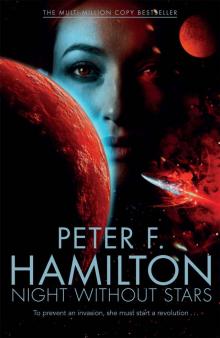 A Night Without Stars
A Night Without Stars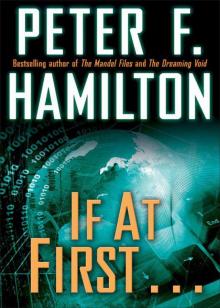 If at First . . .
If at First . . .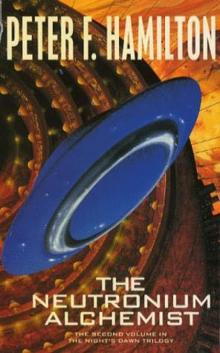 The Neutronium Alchemist
The Neutronium Alchemist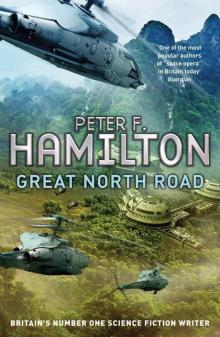 Great North Road
Great North Road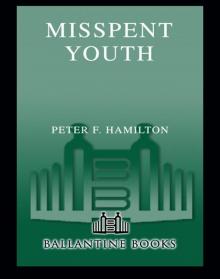 Misspent Youth
Misspent Youth Pandora's Star
Pandora's Star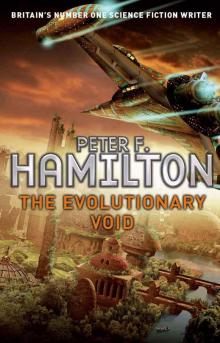 The Evolutionary Void
The Evolutionary Void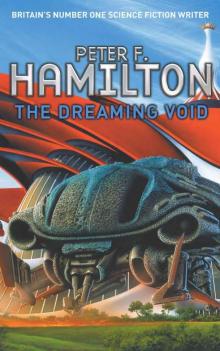 The Dreaming Void
The Dreaming Void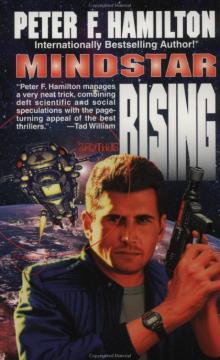 Mindstar Rising
Mindstar Rising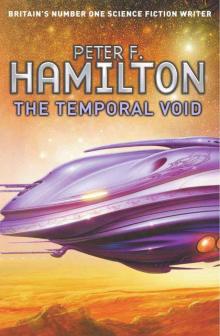 The Temporal Void
The Temporal Void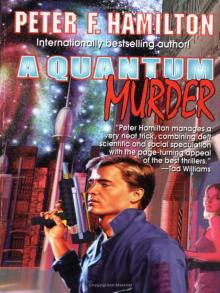 A Quantum Murder
A Quantum Murder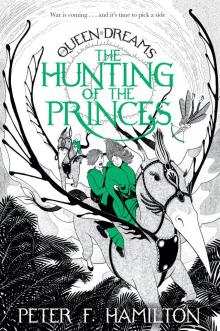 The Hunting of the Princes
The Hunting of the Princes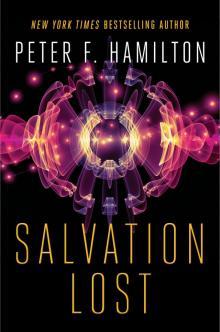 Salvation Lost
Salvation Lost The Dreaming
The Dreaming Salvation
Salvation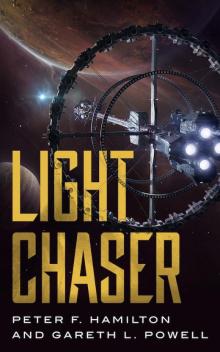 Light Chaser
Light Chaser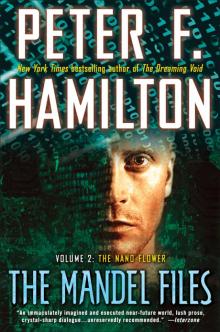 The Mandel Files, Volume 2: The Nano Flower
The Mandel Files, Volume 2: The Nano Flower![The Saints of Salvation [British Ed.] Read online](http://i1.bookreadfree.com/22/the_saints_of_salvation_british_ed__preview.jpg) The Saints of Salvation [British Ed.]
The Saints of Salvation [British Ed.]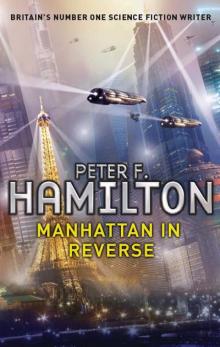 Manhattan in Reverse
Manhattan in Reverse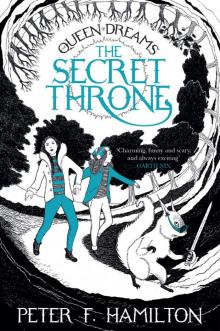 The Secret Throne
The Secret Throne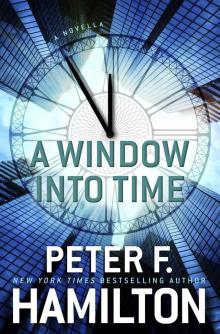 A Window Into Time
A Window Into Time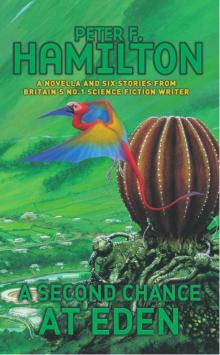 A Second Chance at Eden
A Second Chance at Eden The Nano Flower
The Nano Flower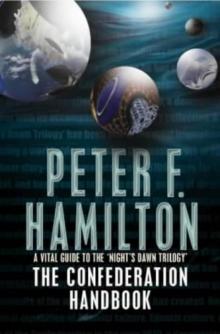 The Confederation Handbook
The Confederation Handbook The Naked God
The Naked God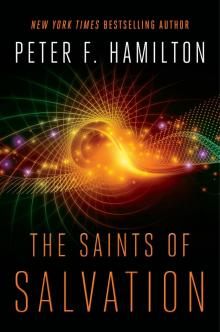 The Saints of Salvation
The Saints of Salvation The Void Trilogy 3-Book Bundle
The Void Trilogy 3-Book Bundle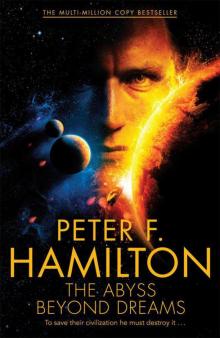 The Abyss Beyond Dreams
The Abyss Beyond Dreams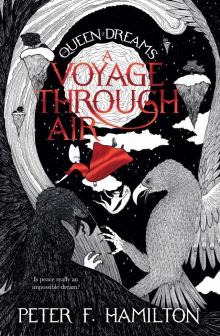 A Voyage Through Air
A Voyage Through Air Judas Unchained
Judas Unchained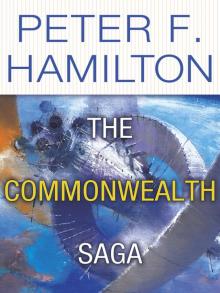 The Commonwealth Saga 2-Book Bundle
The Commonwealth Saga 2-Book Bundle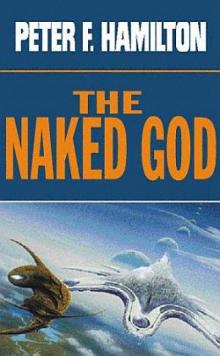 The Naked God - Flight nd-5
The Naked God - Flight nd-5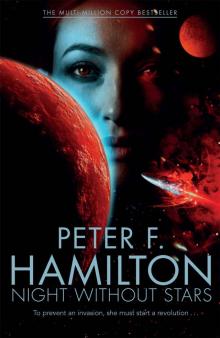 Night Without Stars (Chronicle of the Fallers Book 2)
Night Without Stars (Chronicle of the Fallers Book 2)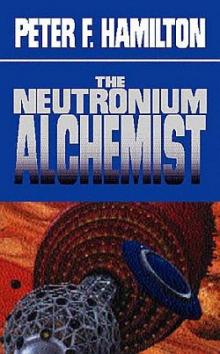 Neutronium Alchemist - Conflict nd-4
Neutronium Alchemist - Conflict nd-4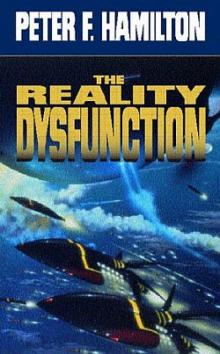 Reality Dysfunction - Expansion nd-2
Reality Dysfunction - Expansion nd-2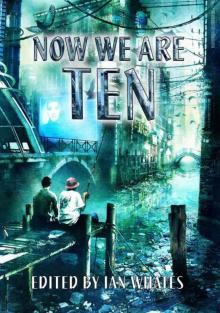 Now We Are Ten: Celebrating the First Ten Years of NewCon Press
Now We Are Ten: Celebrating the First Ten Years of NewCon Press Neutronium Alchemist - Consolidation nd-3
Neutronium Alchemist - Consolidation nd-3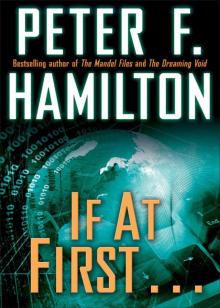 If at First . . . (Short Story)
If at First . . . (Short Story)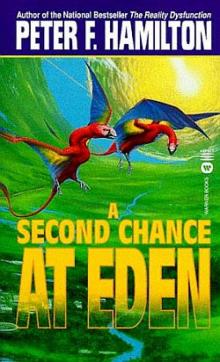 A Second Chance at Eden nd-7
A Second Chance at Eden nd-7 Judas Unchained cs-2
Judas Unchained cs-2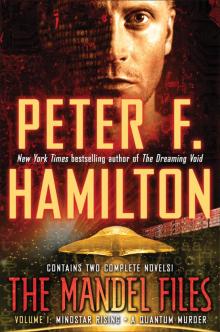 The Mandel Files, Volume 1
The Mandel Files, Volume 1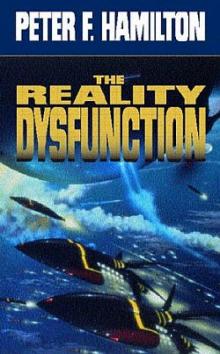 Reality Dysfunction — Emergence nd-1
Reality Dysfunction — Emergence nd-1 The Temporal Void (ARC)
The Temporal Void (ARC) The Mandel Files
The Mandel Files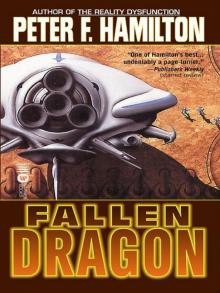 Fallen Fragon
Fallen Fragon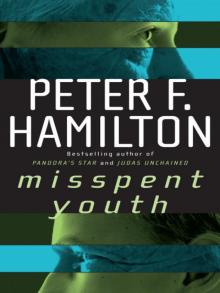 Misspent Youth (commonwealth saga)
Misspent Youth (commonwealth saga)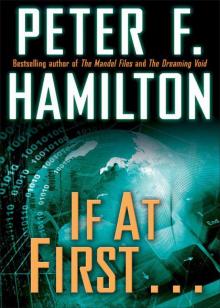 If at First...
If at First... Best of British Science Fiction 2016
Best of British Science Fiction 2016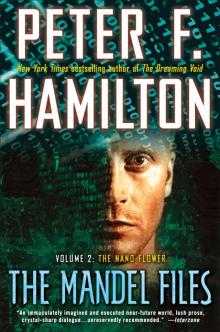 The Mandel Files, Volume 2
The Mandel Files, Volume 2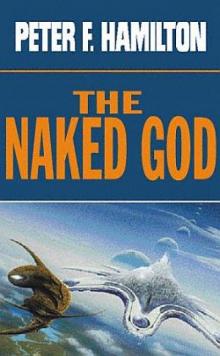 The Naked God - Faith nd-6
The Naked God - Faith nd-6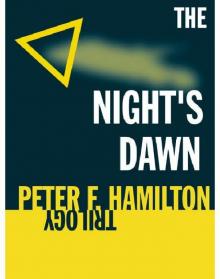 The Night's Dawn Trilogy
The Night's Dawn Trilogy Pandora's Star cs-2
Pandora's Star cs-2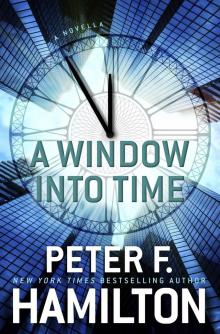 A Window into Time (Novella)
A Window into Time (Novella)